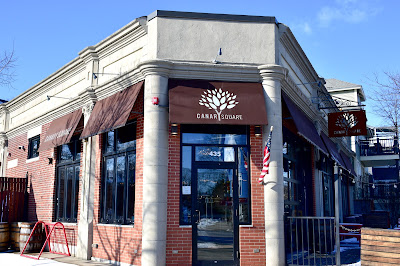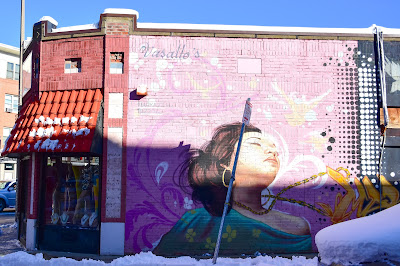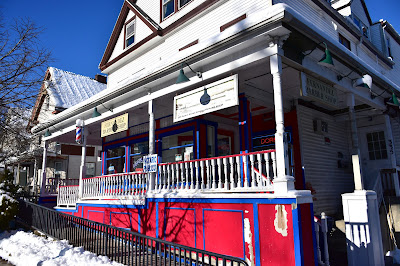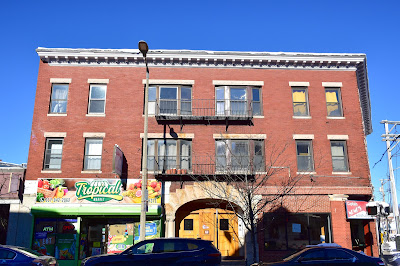From Dave Brigham:
I had such a good time shopping for Christmas presents and taking photos along Jamaica Plain's Centre Street (see January 22, 2022, "Jamaica Plain, Part I: Shopping & Snapping"), that I decided three times in the ensuing weeks to continue my tour north along the main drag and into Hyde Square. The latter neighborhood is known as Boston's Latin Quarter, and I found numerous Latinx-owned businesses and several cool murals reflecting the culture of immigrants who have made their mark on the area. There are other cultures represented in this area, of course, from an Irish bar to restaurants serving Ethiopian and Chinese food.

This rusted sign says, "JAMAICA PLAIN" above a cornucopia of food, and HYDE JACKSON SQUARE MAIN STREET below the bounty. As you can see, this sign has seen better days. It's an anachronism, as in 2019 the group changed its name to Three Squares Main Street, to reflect its focus on a business district that encompasses Hyde, Jackson and Canary squares. I didn't make it as far east as Jackson Square. Maybe someday soon. As for Canary Square, as you'll see below, it's a postage stamp-sized neighborhood.
I love that Streetcar Wine & Beer took its name from the trolleys that once rolled down Centre Street. The sign over the entrance was done by Best Dressed Signs.

From the 1850s, when the West Roxbury Railroad laid tracks in this area, through horse-drawn railcars and electric street cars and into the mid-1980s, Jamaica Plain was well-served with public transit. In 1985, however, the Massachusetts Bay Transportation Authority (MBTA), temporarily closed what was then called the Arborway Line, for repairs and renovation. In the ensuing years, JP residents battled the state for return of the streetcar line, but, long story short, the service was never started up again. Tracks through Centre Street were dug up or paved over in the early part of this century. Buses now run along the route. To read the whole story, check out this excellent Jamaica Plain Historical Society web page.


(Cool mural on the side of Streetcar Wine & Beer, which was also done by Best Dressed Signs.)
I love how murals are seemingly everwhere in Boston and and its surrounding towns and cities. Many of them have been in place for years, and been retouched and updated over time, as you'll see below. Others are newer, livening up the sides of otherwise drab buildings. As I've mentioned before, Boston has an official mural crew run out of the mayor's office, giving kids and teens the chance to help brighten their neighborhoods while also providing links to history and important causes.
On the side of a CVS in Canary Square, I spied the work below.


(Detail from the painting.)
Oftentimes I find it fairly easy to find out through an online search who painted a given mural. With this one, however, I am stumped.
Across Moraine Street from this work of art is Canary Square, which calls itself an American restaurant and bar.

The eatery and the small square around it are named after "William Canary, a Jamaica Plain resident who served in the 101st Infantry Division, who bravely and valiantly lost his life at St. Mihiel, France, September 12th, 1918," according to Canary Square's web site.
At Canary Square, Centre Street heads northeast and eventually east, and South Huntington Avenue heads due north. Walking north on Centre, I looked to the west, down Barbara Street, and noticed a funky building that I had to check out on South Huntington.

This is the former stable of what is known historically as the Andreas Tomfohrde House. Built in 1897, the stable was designed by William Holmes and built by John McNamara & Sons, according to MACRIS. The house was converted to a funeral home in 1946; today it is the Mann & Rodgers Funeral Home. I'm not sure whether the stable is an office or a residence. As someone commented when I posted this photo on Instagram, "Take off that siding!"
Back on Centre Street I spied the Mosaic Boston Church.

The congregation "is a brand new church in Boston," per its web site. "We are a Christian church with a deep love for God, the Bible, and the city." Erected in 1904, this building is known historically as the First German Baptist Church. Most recently, River of Life Church was located in the building.
On the other side of Centre Street is the Whole Foods building, which dates to 1965.

Formerly home to a Hi-Lo Supermarket, this building stands out amid the low-slung retail and restaurant buildings and three-decker apartment houses in the area. Do we call the wavy roofline and stylized sun clock mid-century modern? I don't know, but I like it. Historical side note: at this address once stood the Jamaica Theatre, which was designed by Clarence Blackall. It was demolished in the 1960s.
Across Centre Street from the grocery store, I dug these two doors, situated between Cuban restaurant El Oriental de Cuba and the Jamaica Plain Laundry Centre.

On the rear wall of Whole Foods is a massive and amazing mural.

Painted in 1984 by Rafael Rivera Garcia, a New York-born artist of Puerto Rican descent, this work of art "depicts figures from the mythology of the Taino, the indigenous people of much of the Caribbean including Puerto Rico," according to this Vamonde web page. The mural was restored by the Mayor’s Mural Crew in 2003.

(Detail of the mural.)
Next door is The Haven, which offers "Scottish food, drink and great banter," per its web site.

The bar is located in the same building (but not the exact spot, I don't think) where the legendary Bella Luna/Milky Way Italian restaurant/nightclub/bowling alley complex was founded in 1993.

Bella Luna/Milky Way closed in June 2020, due to, you guessed it, inability to function during the times of COVID. The eatery and enterainment business -- they offered karaoke and dance parties -- moved to the Hafenreffer brewery complex in 2008 (for more about the old brewer, see, "Artist Thinks: 'I HAF to Fix That Smokestack'"). I only went to the Milky Way once, to see local band Honeyglazed. Their two-bass, male-female singing duo approach was pretty sexy and danceable.
Across Perkins Street from The Haven is a groovy painted electrical box.

Supposed to look like a Rubik's cube, I guess. I love the trend of letting artists loose on painting electrical boxes.
Across the little rotary where Centre, Perkins and Day streets say hello to each other, in front of the office of Mark W. Miller, Esquire, is a well-inked former public phone.

Hanging above it is a defaced sign that now reads, "Mr one PEACE WITH NORTH KOREA."

Continuing along the south side of Centre Street, we come to a local institution.


Opened in 1989, the Brendan Behan Pub is one of the few traditional Irish pubs left in Boston. When I moved to Boston in 1990, places like this were everywhere I went, from Allston to Brighton to downtown to Jamaica Plain and everywhere I didn't go. The pub (no kitchen) is named for Irish poet/novelist/playwright/short story writer Brendan Behan, who wrote in both English and Irish. Behan was active in the Irish Republican Army and served time in prison for attempted murder.
A few doors down is an impressive apartment building with retail on the ground floor, clad in green vinyl siding.

Unfortunately, La Casa de Los Regalos (House of Gifts) is no longer open. The building dates to 1935.
One door down, embedded in the storefront for Jamaica Plain Wellness is something that I missed on my first swing through this neighborhood, so I'm really glad I happened upon it when I returned.

Let's break this down: "B" denotes "Boston." "4" indicates the number of miles from this location to the First Town House in Boston, where the Old State House stands today on Court Street. "1735" is the date the stone was placed along Centre Street. "PD" indicates Paul Dudley. This is one of several mile marker stones that Dudley, an attorney general for the Province of Massachusetts and chief justice of the Superior Court, erected (or, more likely, had someone do for him) along various routes. I have seen other ones in Newton, Brookline and Boston's Allston neighborhood over the years.
What's so cool about walking through an old city like Boston is seeing old bump up against new, Colonial cultural touchstones side-by-side with businesses run by newer immigrants. In Hyde Square, there are many small, locally owned businesses amid the few chain outlets. The building below dates to 1900, per the Boston assessing department. In addition to Centre Fashion, a women's clothing store that caters to the local Latinx population, other tenants include Mr V, which sells auto accessories; Caribbean Consultant, Inc.; and Fernandez Travel Agency.

On the side of this building are three fantastic murals painted by Victor “Marka27” Quinonez



I was battling the sun and shadows, as you can see. I wish I'd gotten better photos.
On the north side of Centre Street, in front of the former Blessed Sacrament Church, which I featured in March 2015, is a lovely Little Free Library.

Continuing east, but back on the south side, we come to the Lucy Parsons Center, "an independent, non-profit, radical bookstore and community space." Note the graffiti that says, "ALL COPS ARE DEREK CHAUVIN," the officer convicted of murdering George Floyd.

From Wikipedia: "The Red Book Store (now the Lucy Parsons Center) began in 1969 in a small one-room basement shop in Central Square, Cambridge. It moved two or three times in the first couple of years, before settling into what would be its home until 1983 in a large space on the corner of River and Pleasant streets in Cambridge. In 1983 the project moved to Jamaica Plain....It stayed there until May 1994, returning to Central Square, where it stayed four years until it was evicted so the building could be demolished. In May 1998 it moved into a temporary space in Davis Square, Somerville. Davis Square was a temporary location and with sales suffering, the center was flooded and had to make an appeal for support. In 1999, the project moved to the South End of Boston and finally moved back to Jamaica Plain in 2011.
"The center's namesake, Lucy Parsons, was a radical labor organizer and anarchocommunist in Chicago from the 1880s onwards....One of the original founders [of the bookstore] was professor and activist George Katsiaficas. Initially Maoist, the bookshop was run by an anarchist collective until the late 2010s and is currently operated by a multi-tendency revolutionary collective."
There you go.
Another corner, another fantastic work of public art.

Painted on the side of Pimentel Market, the mural was commissioned by the store's owner, Luis Guerrero. There are actually four girls in the mural, but I couldn't get a good photo that includes them all.
A block away is the United Baptist Church, which is also home to Iglesia Amor y Gracia Boston.

The building dates to 1899.
Next to the church is Mozart Park, which features a playground, a basketball court and some nice murals.


There is also a stunning sculpture, called "Reach," which "symbolizes the immigrant experience of reaching up to climb the ladder of success in America," according to the park's web site.

The work was completed by artist Douglas Kornfeld, who has installed sculptures all around the globe.
In between the park and the church is a groovy, painted electrical box.

Continuing east along Centre, on the north side of the street is a newer strip mall, featuring a Dunkin' shop, a T-Mobile store, a Bank of America branch, a dentist office and other businesses. Behind that L-shaped building is a Stop & Shop grocery store. On the south side of Centre, however, is the kind of urban mish-mash that is what makes cities great, although plenty of folks find this cheek-by-jowl style of architecture ugly (See: the destruction of Boston's West End back in the 1960s.).

On the left is Freddy's Market, which offers "Productos Latinos," in addition to ice cream, vegetables, groceries and lottery tickets. On the right is Latino Restaurant, which, judging by the style of sign and the lack of an area code on it, has been around for quite some time. And judging by the outsized lobster claws on the sign, I guess this place specializes in seafood.

The building dates to 1930 and, as you can see, also features apartments behind and above the storefronts. This is such a classic American city concept, but one that is increasingly being demolished and turned into shinier places catering to people with more money. Two doors down, past a dry cleaners, is Young Kong Restaurant.

The building dates to 1940. I'm guessing there have been many types of restaurants here over the years. Again, what's great about this strip of Centre Street is the mix of types of ethnic foods and the mom-and-pop attitude to the businesses.
Now I'm gonna hop over to the north side of Centre Street and work my way back toward the west. Just past the aforementioned strip mall is Fellowship Church of God.

I absolutely love the trio of signs out front. So much nice than the typical drab greeting most churches offer. The building dates to 1899, and was once home to St. Andrew's Methodist/Episcopal Church, I believe.
A block away, on the corner of Centre and Gay Head streets, is a nice old house with storefronts on the first floor, including Fernandez Beauty & Barber Shop.

This place dates to 1920. I'm curious about how Gay Head Street got its name. From 1870 to 1997, Gay Head was the name of a town on Martha's Vineyard. In 1997, after a town vote, the name was changed to Aquinnah, a Wampanoag word that means "land under the hill," per Wikipedia. I suppose whoever developed the street just liked the name, or had some connection to the Vineyard.
Next is another representation of what makes this area great: Yolanny Salon; La Nacional, a place where locals can receive money from overseas or send it to relatives back home; an apartment house; and, most curiously, Radio Tropicalisimo de la Tarde.

I gather that the radio program, which is available on Watertown, Mass.-based WRCA, broadcasts in Spanish beginning at 3:00. The station is owned by Beasley Media Group, and carries financial news from Bloomberg Radio, along with local news, traffic and weather reports. Founded in 1948 as WCRB, the radio station began as a Waltham-based community station. Over the years, it has served as classical music station, a big band outlet, an easy listening channel, a home for country music and more. It has leased time to ethnic broadcasters since 1991, according to Wikipedia.
Up next is The Old Havana restaurant, which has been around since 2013.


The building dates to 1930. I'm not sure if it's always been a restaurant space.
When I saw the building below, with its beautiful, arched entryway, I guess that perhaps it was once a police station.

I've searched and searched, however, and found no details whatsoever about this place, other than that it was built in 1910. Retail tenants include Captain Nemo's Subs & Pizza and Tropical Market.
The final two places on this tour are located at the small rotary where Perkins, Centre and Day streets meeet.

The Blue Nile restaurant specializes in Ethiopian cuisine. I'm not sure how long the eatery has been here.
After posting so many photos of cool JP street art, it seems appropriate to end this two-part series with yet another awesome mural on the side of a business that is unfortunately defunct.

Located on the side of the former Beauty Master salon, this work of art is another by Victor "Marka27" Quinonez.
I hope you've enjoyed this trek through Jamaica Plain as much as I did (three times!). I hope to check out other parts of JP in the near future, especially some of the old brewery complexes. Stay tuned!

No comments:
Post a Comment